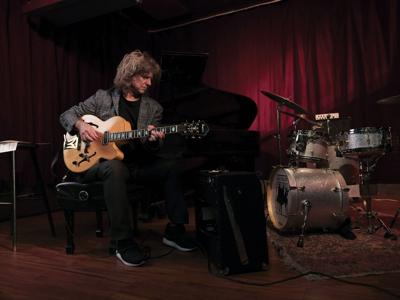
Pat Metheny
An instantly identifiable sound, masterful technique and unending creative ambition are just some of the qualities that have stamped guitarist, bandleader and composer Pat Metheny as a key figure in contemporary jazz circles since the late ’70s. From his days as a student and later colleague of Gary Burton’s at Berklee through decades of heading various combos, as well as his lengthy partnership with Lyle Mays that mirrored those of other great jazz unions like Duke Ellington and Billy Strayhorn, and his unrelenting desire to explore numerous idioms, Metheny has never resorted to imitation nor become musically stagnant.
The Kansas City native’s list of memorable LPs is extensive. He’s frequently toured throughout his career, and his latest, this time a solo endeavor, comes to the Ryman Auditorium Monday night. His newest release, July’s Dream Box, is a nine-song, 56-minute collection, his third for BMG’s Modern Recordings. Metheny compiled it over the course of 2022, going through a host of songs he’d placed on his laptop during 160 days on the road.
But it would be a mistake to assume Dream Box merely represents an update of things he did on either 1979’s New Chautauqua or 2011’s What’s It All About due to its being a solo guitar release. From the standpoint of its lean yet passionate voicings, it can be favorably compared to 2004’s One Quiet Night, except his playing is far more forceful on most of these tunes — particularly the originals that represent its finest moments. Composer, music professor and jazz historian Bob Gluck, the author of a forthcoming volume for the University of Chicago Press titled Pat Metheny: Stories Beyond Words, characterizes the guitarist’s work, both past and present, in this fashion.
“Metheny’s music has steadily unfolded over these five decades in a multitude of ways,” writes Gluck, who is also a pianist, rabbi and professor of music at the State University of New York, Albany. “As early as the 1980s, his music began to expand in scale and orchestration, while he also continued to grow as an architect of concise short forms. He has always been at the leading edge of emerging musical technologies, from sequencing to automata (the MIDI-controlled robotic instruments on his album Orchestrion), to expanding his sonic palette with a wide variety of guitars and electronics.
“True to Metheny’s musical history,” Gluck says, “the current solo tour will certainly include all kinds of surprises, in this case not only the quiet ballads featured on Dream Box but a wide range of repertoire, a multitude of guitars, up-tempo Orchestrion ensemble works … you name it. The idea of evolution can also imply constant discovery and the invention of new ways to explore and expand one’s lifelong ‘musical DNA.’”
Evidence of that expansion includes the subtle Latin melodic flavor and blues intonation on Dream Box’s “Trust Your Angels,” as well as the crisp melodic approach and lean chordal structure of the opening number “The Waves Are Not the Ocean.” He delves into the Brazilian mode with his cover of Luiz Bonfá’s “Manha de Carnival” (“Morning of the Carnival”), easily navigating and exploring the tune’s samba/cumbia foundations. By contrast, he provides Russ Long’s “Never Was Love” — not exactly a jazz standard and more a favorite of rockers — with some intricate and impressive melodic exposition. Metheny’s sentimental side is showcased through his rendition of Jule Styne and Sammy Cahn’s “I Fall in Love Too Easily,” though it’s doubtful Cahn would have included the touches of reverb Metheny utilizes throughout.
Dream Box is both beautifully lyrical and superbly performed, another significant addition to one of the most varied and individualistic legacies and catalogs among modern improvisers and composers.





